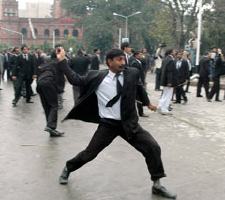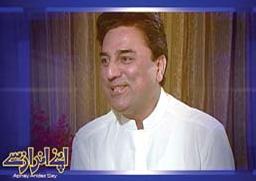Adil’s post on Kasuri incident has prompted me to recall the recent thrashing of Naeem Bokhari by his peers.


That Mr. Naeem Bokhari, documented a nasty invective against the Chief Justice of Pakistan remains a tragic event in our recent history. This letter, wittingly or unwittingly became a basis for that notoriously illegal reference against the top judge of the country. Bokhari should not have become a party to the typical power games as an officer of the court and he needs to explain much more than he already has.
What happened thereafter is all too well known to be repeated here. The apex court backed by the public opinion restored the honour of its Chief and effectively altered the destiny of this country. A new beginning was scripted by the citizenry with immense faith in the Constitution and  its guardians. Never has the predatory executive suffered such a blow in Pakistan’s turbulent history. Ordinary, unlettered Pakistanis, joined in to conclude that due process was something intrinsic, vital and non-negotiable. Exactly after a week the Lord Chief Justice was reinstated by his brothers, while addressing a seminar, he noted:
its guardians. Never has the predatory executive suffered such a blow in Pakistan’s turbulent history. Ordinary, unlettered Pakistanis, joined in to conclude that due process was something intrinsic, vital and non-negotiable. Exactly after a week the Lord Chief Justice was reinstated by his brothers, while addressing a seminar, he noted:
“The last four months in our national history have changed something forever. I feel proud to say that not only the judiciary and 90,000-plus black-coated fraternity, but the entire civil society is ready to sacrifice everything to uphold the Constitution and achieve rule of law…”
A few days later, we read the news that Bokhari was manhandled by his ‘black-coated’ fraternity when he re-appeared in the Courts after a long break. Naeem Bokhari broke the silence and wrote in The News on what exactly transpired on that fateful day when the Rawalpindi lawyers’ “fury” resulted in his humiliation and ruthless thrashing. Bokhari’s license was canceled during the lawyers’ movement and later a High Court Judge had suspended that decision. However, when Bokhari tried to argue in a Rawalpindi Court, the secretary of the Rawalpindi Bar stated that the High Court order had been “passed by a Shia judge, who according to another lawyer was a tout.” Later, some of the lawyers were ready to strip him naked and thrash. The police intervened in this process but according to Bokhari the lawyers wanted his “physical custody.”
Bokhari painted a harrowing picture of his treatment. He alleges that he was “forcibly pushed out of the courtroom and hit on the head again and again.” At the end of this mob frenzy, Bokhari and his associate were severely beaten. Symbolically Bokhari’s coat was snatched and his shirt was torn. Humiliating as it is, the whole incident is reminiscent of tribal notions of justice.
While the misgivings against the perceived collaborators of the executive may be justified, such abusive treatment is not. It is plainly out of the ambit of the laws and code of conduct under which the legal profession is regulated. In fact, such incidents can taint the heroic image that the lawyers’ bodies have earned through their relentless, spectacular struggle.
 Having said that, Bokhari’s contention is a little shaky that he will not apologize for his letter for which he considers “answerable to the court, not to any mob.” He is definitely not accountable to mobs but his letter was neither benign nor factually correct.
Having said that, Bokhari’s contention is a little shaky that he will not apologize for his letter for which he considers “answerable to the court, not to any mob.” He is definitely not accountable to mobs but his letter was neither benign nor factually correct.
Now that the legal fraternity has won its prime battle and an independent Supreme Court and political process will tackle country’s quagmire, it is time that the Bar leaders should pay attention to the long-neglected issues concerning regulation and internal accountability of the legal profession.
The state of legal education barring a few elite institutions mirrors the general collapse of the education system. Bar Councils hold uneven entry examinations and relaxed entry policy is doing more harm than good to the profession. Countries such as Malaysia, India and Sri Lanka have improved legal education and Bar-entry examinations. We are lagging behind in this respect; and resultantly the quality of entrants is not the best. Similarly, action against erring lawyers is not always certain as the politics and electoral prowess of Bar subgroups (often organized along the lines of caste or sect) impede the process. These issues are well known to the legal community and they have the best solutions to correct this situation. This is the best time for the Bar leaders to take tough decisions to reform the way their profession is regulated.
If Bokhari’s story is true, then to uphold professional reputation and ethics, the Bar should question the members of fraternity who handled their “foes” – Bokhari and Kasuri among others – in a feudal manner. Would it be too much to ask that the Supreme Court should take suo moto notice of this incident and reaffirm that it is the ultimate guardian of constitutional rights and that it will not let its law-officers, especially in their name, behave the way an unaccountable executive governs.
And, Mr Bokahri, will have to set the record straight and apologize to the Court for unduly scandalizing the highest officer holder of the judiciary.
Raza Rumi blogs at Jahane Rumi



















































there is no excuse for jungleepun and jahalat, whether it is committed in the US or in Pakistan. I was appalled by the way the academia at Columbia University and the mainstream media treated the Iranian Premier. Wahan pay verbal slaps deliver huay. Aur yahan pas asal thuppar. The treatment of Naeem Bokhari is no less than the way Ahmadinejad was treated in NY.
And mind you i am not exactly beholden to either of them. Both are pandering to their own agenda but there are norms of behaviour and etiquette that in this day and age are largely missing!!
Is this the frustration that manifests itself in a mob frenzy if suppressed for too long? What follows it, is any one
Lets look at …… who like to become lawyers in Pakistan “by choice” these days after they are done with high school?
Aren’t they the ones those who did not get admission in other disciplines?
This profession is not like old times, when we saw Qaid-e-Azam and other great lawyers like to adopt it on priority and try to excell in their fields.
So…. Should we expect something good?
The lawyers are no saints and this behavior is expected of them. Just consider the plight of traffic policemen who dare to stop a lawyer who violate traffic rule. Many policemen have been kidnapped and given a thrashing by these exalted lawyers in the bar rooms of courts for this thing. It is therefore not a surprise that they thrashed Naeem Bokhari and then one of them sprayed black paint on Kasuri’s face.
What is needed is a realization that lawyers also have to be law abiding citizens subject to same rules and regulations that the ordinary citizens are. Being lawyers does not give them the license to break laws and thrash their own colleagues and hapless policemen. The sooner this realization sets in not only lawyers but also other pressure groups like the journalists the better it will be for their own profession.
As a senior attorney myself of Pakistani origin, practicing in the US for over 17 years, I am outraged at how a senior lawyer, Naeem Bukhari was brutally and shamefully assaulted in a Pakistani court. I am no friend of Mr. Bukhari and find his notorious letter writing stunt absolutely despicable. But at the same time, I firmly believe in what Voltaire once said, some thing along these lines: Although I abhor what you said, but Iwould still fight for your right to say it till my last breath.
The perpetrators responsible for such outrageous acts must be identified and brought to justice. Also, the local and national bar associations in Pakistan must come out strongly and unequivocally on this issue, and must categorically condemn such barbaric acts with one voice.
At the same time, without meaning to dilute the seriousness and gravity of this incident, I must add that one ought to resist the temptation of indicting the entire legal community on the basis of some isolated incidents.
We all have our shares of bad apples in our respective professions.
And after all, the Pakistani legal system and Pakistani legal community do not operate in isolation; they both absorb and exert certain influences ( good, bad, and ugly) prevalent and embedded in our culture, and society at large. In Pakistan, the entire society has a lot to catch up with and a long way to go in all spheres of human activity.